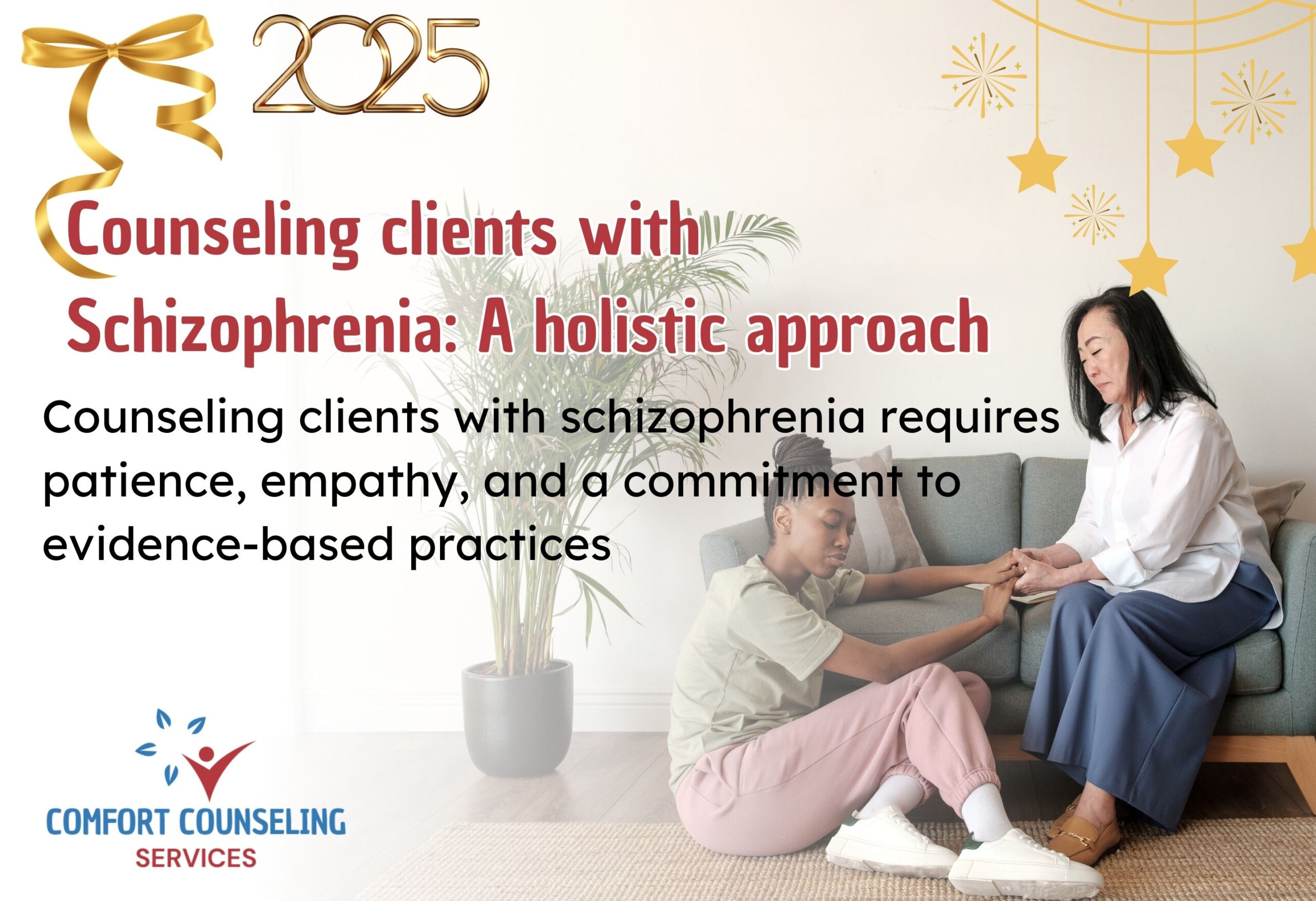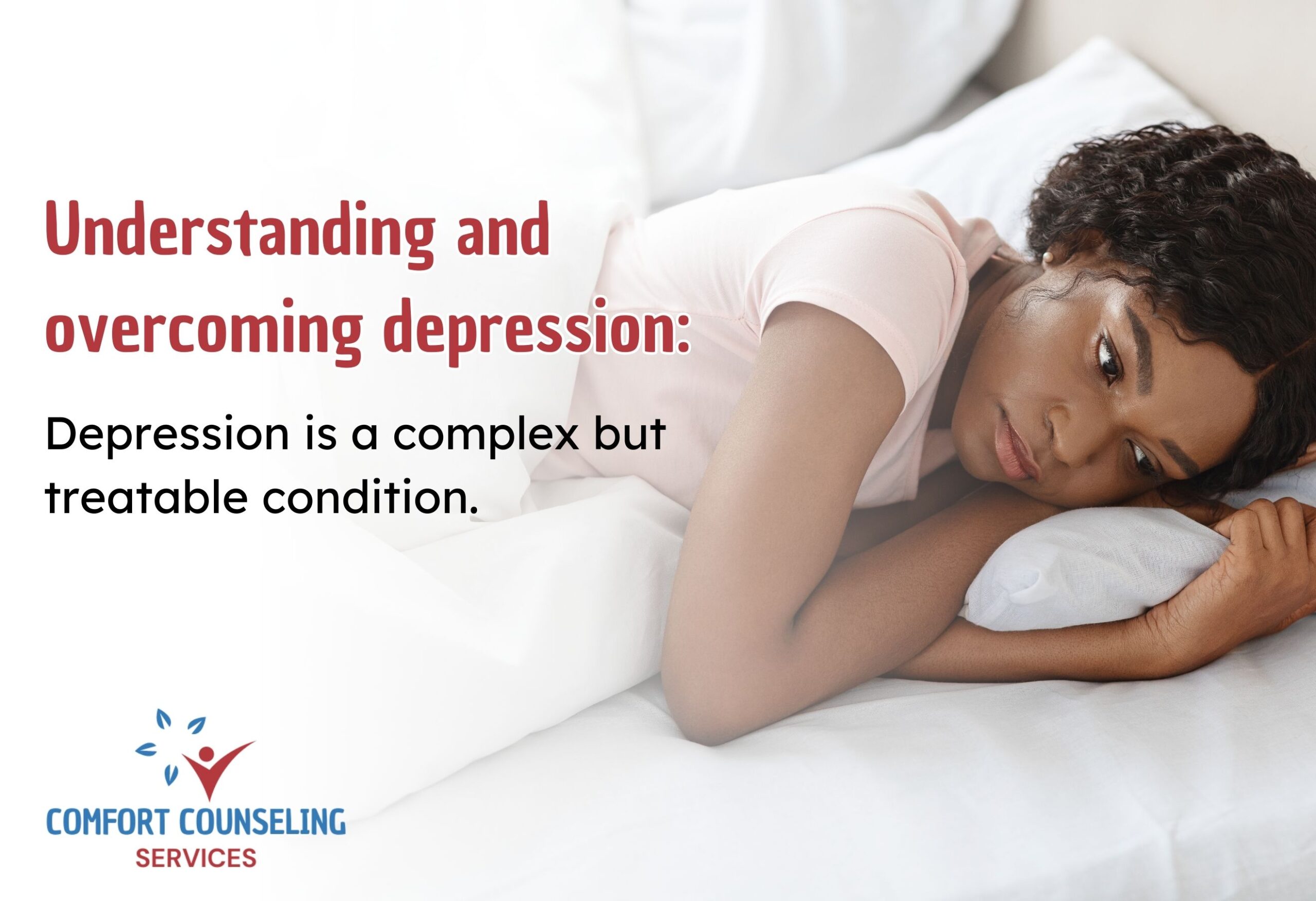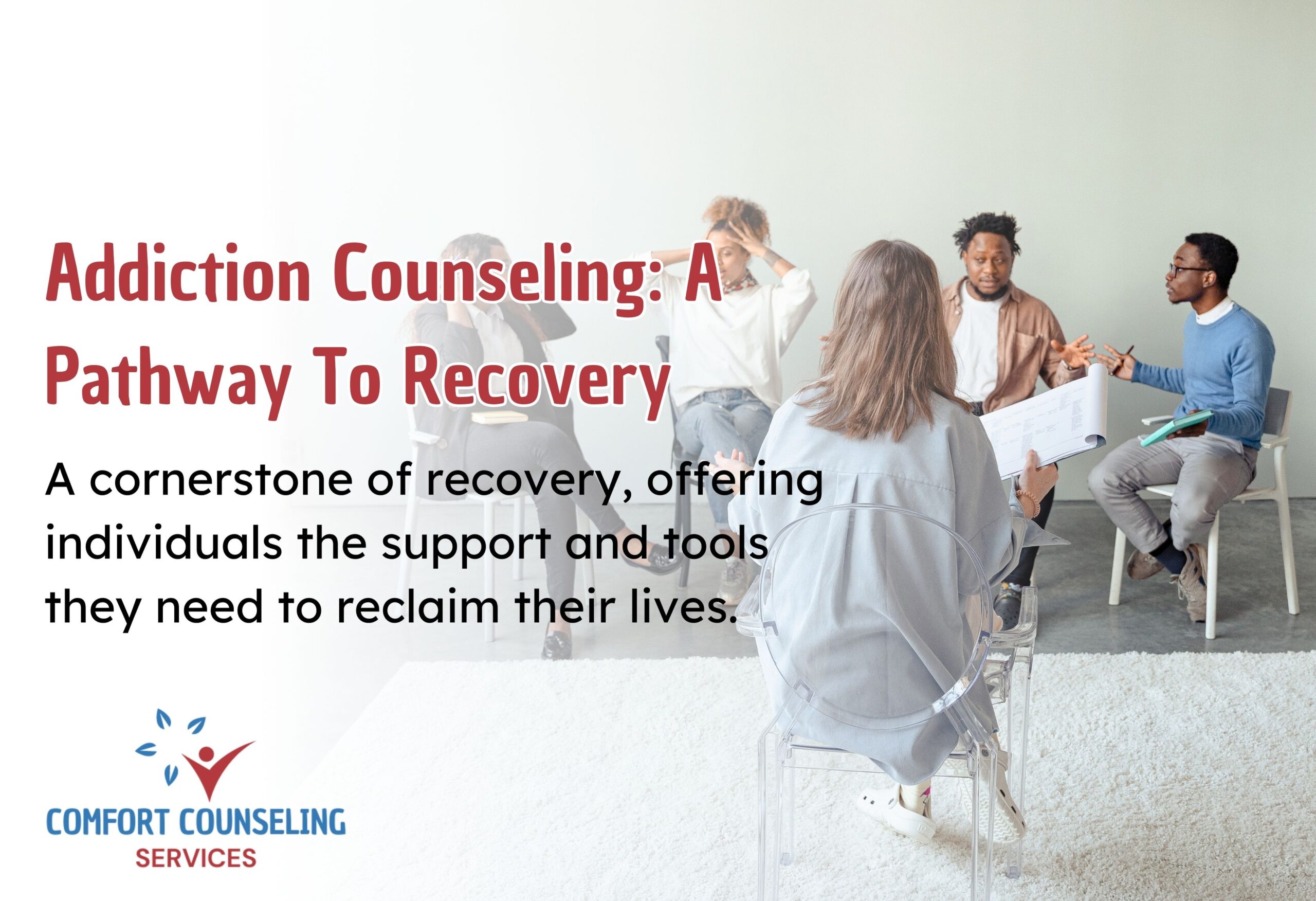Schizophrenia is a complex mental health condition that affects approximately 24 million people globally, representing about 1 in 300 individuals (World Health Organization [WHO], 2022). It is characterized by disturbances in thought processes, perceptions, emotional responsiveness, and social interactions. At Comfort Counseling Services, we understand the challenges faced by individuals living with schizophrenia and their families, and we provide evidence-based counseling approaches to promote healing and recovery.
Understanding schizophrenia
Schizophrenia often manifests through symptoms such as hallucinations, delusions, disorganized thinking, and impaired functioning. The disorder typically emerges in late adolescence or early adulthood, with genetic, biological, and environmental factors contributing to its development (Insel, 2010).
Despite its chronic nature, schizophrenia is treatable, and many individuals experience significant improvements with appropriate interventions, including counseling, medication, and social support (National Institute of Mental Health [NIMH], 2022).
The role of counseling in managing schizophrenia
Counseling plays a crucial role in supporting clients with schizophrenia, helping them develop coping strategies, manage symptoms, and improve their quality of life. Evidence-based therapeutic approaches include:
1. Cognitive Behavioral Therapy (CBT)
CBT helps individuals identify and challenge distorted thought patterns and develop healthier coping mechanisms. Studies show that CBT can reduce the severity of psychotic symptoms and improve functioning (Morrison et al., 2014).
2. Psychoeducation
Educating clients and their families about schizophrenia is essential for reducing stigma, enhancing treatment adherence, and fostering a supportive environment. Psychoeducation has been shown to improve relapse rates and overall outcomes (Xia et al., 2011).
3. Family therapy
Family interventions address communication patterns, conflict resolution, and caregiving challenges. This approach is particularly effective in reducing relapse rates and improving family functioning (Pharoah et al., 2010).
4. Social skills training
This therapy focuses on enhancing interpersonal and daily living skills, enabling clients to reintegrate into society and lead more independent lives. Social skills training has demonstrated effectiveness in improving social functioning and reducing social withdrawal (Granholm et al., 2007).
Challenges in counseling clients with schizophrenia
Counselors working with clients with schizophrenia often face unique challenges, including:
- Stigma and misunderstanding: Many clients face societal stigma, which can discourage them from seeking help (Corrigan & Watson, 2002).
- Medication non-adherence: Some clients struggle with medication adherence due to side effects or a lack of insight into their condition.
- Co-occurring disorders: Schizophrenia often coexists with substance use disorders, depression, or anxiety, complicating treatment plans (Buckley et al., 2009).
At Comfort Counseling Services, we address these challenges by providing individualized care, fostering a non-judgmental environment, and collaborating with medical professionals and family members.
Counseling Strategies for Success
- Building a therapeutic alliance
Establishing trust is the foundation of effective counseling. Active listening, empathy, and consistent support are vital for fostering a strong therapeutic relationship (Rogers, 1957). - Focusing on strengths
Highlighting clients’ strengths and accomplishments can enhance self-esteem and motivation. Encouraging small, achievable goals fosters a sense of empowerment. - Incorporating holistic approaches
Holistic interventions, such as mindfulness-based practices, art therapy, and stress management techniques, can complement traditional therapies and enhance overall well-being (Chien et al., 2019). - Encouraging peer support
Peer support groups provide a safe space for clients to share experiences, reduce isolation, and learn coping strategies from others facing similar challenges.
How Comfort Counseling Services Can Help
At Comfort Counseling Services, we are committed to supporting individuals with schizophrenia and their families.
Our services include:
- Individual counseling: Tailored strategies to address specific needs and goals.
- Family support programs: Empowering families to provide effective care and build stronger relationships.
- Community outreach: Raising awareness about schizophrenia to reduce stigma and promote understanding.
- Workshops and training: Equipping caregivers and mental health professionals with the skills needed to support clients effectively.
Conclusion
Counseling clients with schizophrenia requires patience, empathy, and a commitment to evidence-based practices. At Comfort Counseling Services, we believe in the potential for recovery and aim to empower individuals to lead fulfilling lives despite the challenges they face.
For more information or to schedule a consultation, visit our website or contact us directly. Together, we can make a difference in the lives of those affected by schizophrenia.
References
- Buckley, P. F., Miller, B. J., Lehrer, D. S., & Castle, D. J. (2009). Psychiatric comorbidities and schizophrenia. Schizophrenia Bulletin, 35(2), 383-402.
- Chien, W. T., Leung, S. F., & Yeung, F. K. (2019). Current approaches to treatments for schizophrenia spectrum disorders, part I: An overview and medical treatments. Neuropsychiatric Disease and Treatment, 15, 259-283.
- Corrigan, P. W., & Watson, A. C. (2002). Understanding the impact of stigma on people with mental illness. World Psychiatry, 1(1), 16-20.
- Granholm, E., McQuaid, J. R., McClure, F. S., & Pedrelli, P. (2007). A randomized controlled trial of cognitive behavioral social skills training for middle-aged and older outpatients with chronic schizophrenia. American Journal of Psychiatry, 164(3), 528-536.
- Insel, T. R. (2010). Rethinking schizophrenia. Nature, 468(7321), 187-193.
- Morrison, A. P., Turkington, D., Pyle, M., Spencer, H., Brabban, A., Dunn, G., … & Hutton, P. (2014). Cognitive therapy for people with schizophrenia spectrum disorders not taking antipsychotic drugs: A single-blind randomized controlled trial. The Lancet, 383(9926), 1395-1403.
- Pharoah, F., Mari, J. J., Rathbone, J., & Wong, W. (2010). Family intervention for schizophrenia. Cochrane Database of Systematic Reviews, (12).
- WHO. (2022). Schizophrenia. Retrieved from https://www.who.int.
- Xia, J., Merinder, L. B., & Belgamwar, M. R. (2011). Psychoeducation for schizophrenia. Cochrane Database of Systematic Reviews, (6).
This blog is part of Comfort Counseling Services’ ongoing effort to provide education, support, and resources for mental health care. Stay connected for more updates and insights!



